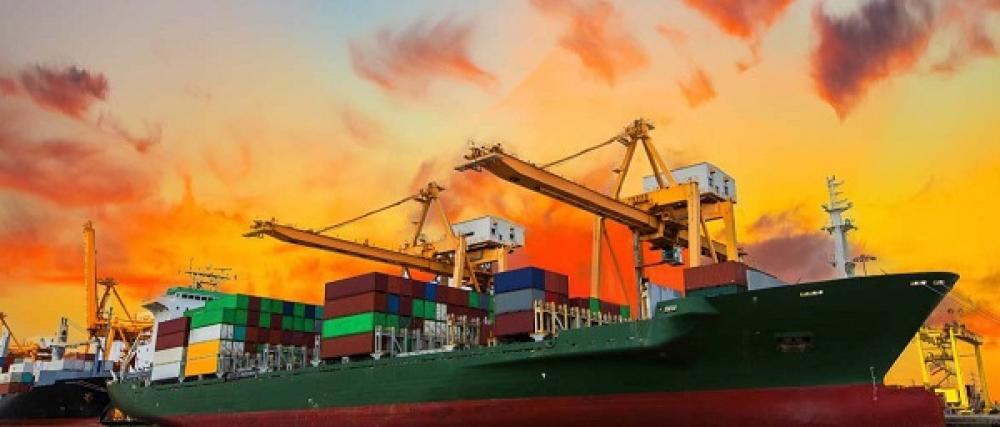Shippers pursue multiyear deals to ease pain of elevated ocean rates
29 April 2021

Unloading Container at the port
Shippers are increasingly seeking multiyear ocean shipping contracts to hedge against the elevated rate levels that prevail in both the spot and long-term markets, carriers say.
The long-term contracts, which can extend up to 10 years, according to Kim Pedersen, global head of sales and marketing at A.P. Moller-Maersk, are typically linked to either one of the rate indices or open-ended with a rate review every 12 months.
“With more and more customers, we are signing up for contracts that are way beyond the traditional 12 months,” Pedersen told JOC.com. “They could be two years, three years, five years, and even 10 years.”
A spokesman for Hapag-Lloyd confirmed the carrier has also noticed a trend of shippers seeking multiyear contracts, although he declined to elaborate.
Underpinning a desire to fix rates for longer periods are spot and contract rates that are at highly elevated levels compared with pre-pandemic 2019 on both the Asia-North America and Asia-North Europe trades, with little expectation of significant declines through the second half of this year.
In fact, Maersk this week doubled its earnings guidance for 2021, crediting the strong trans-Pacific market. It expects earnings before interest and taxes to be in the range of $9 billion to $11 billion and predicts global demand growth could rise 5 percent to 7 percent this year. That would be 200 basis points higher than its original forecast, “primarily driven by the export volumes out of China to the US.”
Data from rate platform Xeneta show Asia-US West Coast spot rates are at $4,089 per FEU, an increase of 155 percent compared with the same week in 2019. Contract rates on the trans-Pacific are up 44 percent on 2019 at $2,692 per FEU.
Asia-North Europe rates are at $4,123 per TEU this week, up 492 percent compared with the same period in 2019. Contract rates of longer than 90 days were at $2,115 per TEU, 185 percent higher than those signed in 2019.
Lock in long-term stability
Jens Bjorn Andersen, CEO of DSV Panalpina, said when it comes to the unpredictable ocean markets, he was advising shippers to at least lock in some longer-term deals to provide rate stability.
“If they can afford it, I always advise our customers to make some semi-long agreements, so at least they know what they are getting,” he told JOC.com in an interview this week. “Playing only the spot market is difficult, but if you cannot accept paying the high current day-to-day rate, then it is not a bad idea to make an agreement where you follow a freight index. You bear the burden when the rates are high, but you take the benefits if rates go down. You will not have to speculate on how the market is developing.
“Of course, if you locked in rates a year ago, that would have been super beneficial, but then everything is better with hindsight,” he added.
While the record increases have made multiyear contracts more attractive, Michael Braun, vice president of customer solutions at Xeneta, said the question was whether cargo owners would honor the contracts should the market turn.
"At the moment shippers are open to fixing prices for an extended period, but no one is going to want to be locked into higher contracts for three or five years,” he said.
However, Braun said index linking was a way the longer-term agreements could be more flexible. “Our customers are indexing their long-term contracts with the Xeneta Shipping Index (XSI) because they want a baseline for negotiations whenever the market is going down,” he said.
Carrier interest fixed on spot market
Dominique von Orelli, global head of ocean freight at DHL Global Forwarding, said carriers were focused on riding the wave of high short-term rates, with multiyear contracts of more interest to shippers or non-vessel-operating common carriers.
“Pricing models will have various tiers going forward — long, short, spot,” he told JOC.com. “If the market moves in either direction many, but not all, customers and carriers will open these contracts.”
While moves toward multiyear contracts are being driven by shippers seeking more resilient supply chains after the COVID-19 disruptions, the long-term agreements also play well into Maersk’s integrated logistics strategy.
Pedersen said the contracts are more aligned to shippers’ global supply chains and corresponded with multiyear contracts cargo owners usually sign with inland logistics providers and warehouse operators.
“If you sign a three-year contract with the warehouse part of their supply chain, it is more practical to sign an ocean contract that is the same, otherwise you will not be able to fully utilize the advantages of integrated logistics and manage it with a digital layer on top,” he said.
Typically, contracts were either index-linked or open with no end date and the rate reviewed every 12 months, he added.
“If the intent is there to align the contract period with the logistics and services period, then we need to ensure it is competitive all the way,” Pedersen said. “But we feel that in the retail industry, for example, predictability on the transport cost is equally important as riding the wave of today’s rate, and so the mechanisms in the multiyear contracts are not to optimize your commodity buying, but more to ensure you stay in a competitive space.”
Source : https://www.joc.com/maritime-news





